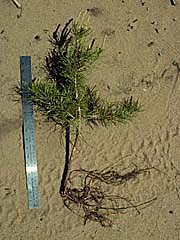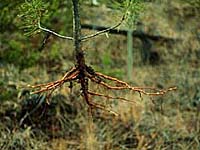
![[PARTS OF A TREE - ROOTS HIGHLIGHTED]](../../media/drawings/tree_parts_roots.gif) Roots are usually found at the lowest end
of the tree and spread in a vast and intricate network, like underground
branches. They usually extend as far underground as the twigs
spread in the crown of the tree. If laid end to end, the roots
of some giant oaks would stretch more than 160 km in length. In
addition to anchoring the tree in the ground, roots absorb water
and nutrients from the soil. The tree uses these to manufacture
food and grow.
Roots are usually found at the lowest end
of the tree and spread in a vast and intricate network, like underground
branches. They usually extend as far underground as the twigs
spread in the crown of the tree. If laid end to end, the roots
of some giant oaks would stretch more than 160 km in length. In
addition to anchoring the tree in the ground, roots absorb water
and nutrients from the soil. The tree uses these to manufacture
food and grow.

|
Roots branch into smaller and smaller structures, where new growth occurs. This newest area of growth is lined with roots hairs. It is these structures which penetrate into the soil and absorb the nutrients required by the tree. Each root hair is a thin-walled extension of an epidermal cell. A large vacuole occupies the central part of a root-hair cell. This space is filled with water containing dissolved sugars, salts and a variety of other compounds Root hairs absorb necessary gases, minerals and water through diffusion and active transport. These substances are then passed through adjacent cells and into the conducting tissues of the root and eventually to the stem and leaves of the tree where required.
|
The terminal portion of a root contains a variety of cells. The root cap is found at the tip of the root and consists of cells which protect the meristem or area of actively dividing cells. A single layer of epidermal cells line the outside of the root. Inside this protective layer is the cortex - tissue consisting of living, thin-walled cells, often almost broad as long, and permeated by a system of intercellular spaces containing air. These cells are called parenchyma and are found in stems as well. The inner core of the root contains the vascular tissue that is referred to as the vascular cylinder. This cylinder is made up of xylem and phloem, endodermis, pericycle and cambium cells. It is the xylem that transports water and minerals and the phloem that transports nutrients to the tree.
|

|